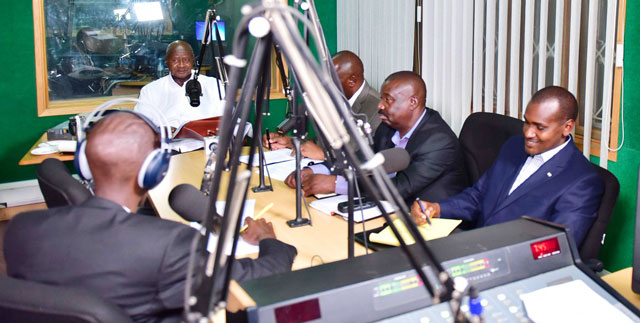
Mbarara, Uganda | PPU | President Yoweri Museveni has called on the media to contribute to the development of the country by providing Ugandans with the right information.
Speaking at Radio West, one of Vision Group’s radio and TV stations, President Museveni said that instead of informing Ugandans about government projects and how the country stands to benefit from the projects, the media and the opposition politicians are spreading falsehoods about the proposed amendment to the land law.
Museveni was accompanied to the radio talk show in Mbarara by the Minister of Minister of ICT and National Guidance Frank Tumwebaze, the Minister for Housing Chris Baryomunsi and the Deputy Attorney General Mwesigwa Rukutana. Museveni is on a week-long radio campaign to inform the nation on land matters and other national issues.
“I have come to tell you that government is not trying to steal people’s land. We want to change the law for public interest. We need to construct roads, the railway and electricity. When we make the road to Lyantonde or the Bypass here in Mbarara town, Museveni does not have any shares in it. It is for everyone’s benefit,” he said.
Museveni said that it was the National Resistance Movement (NRM) government that legislated to give Ugandans land ownership in the 1995 constitution and therefore the same government cannot be the one to take away from Ugandans the right to own land as the media and the opposition politicians are telling Ugandans.
“Long ago, land used to belong to the Omugabe (King) and during colonial period it used to belong to the queen. When we made the constitution we changed the clause that said, “land belongs to government” to “land belongs to the people”,he said.
Museveni explained that the proposed amendment to the land law does not aim at grabbing land from Ugandans but is rather meant to ease government acquisition of land for infrastructure development such as the railway, roads and electricity.
“For government to acquire someone’s land, the owner must be compensated and that government was also coming up with more avenues for discontented landowners to appeal in order to receive fair compensation,” he said.
 The Independent Uganda: You get the Truth we Pay the Price
The Independent Uganda: You get the Truth we Pay the Price





